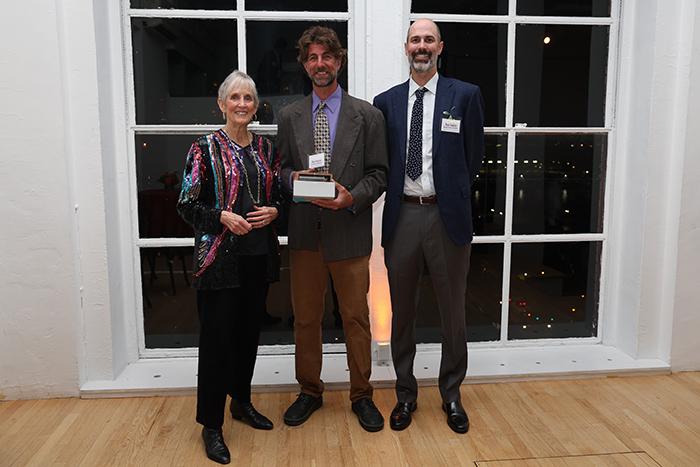College Farm Waste-to-Energy Project Honored With National Award

Energy Vision founder Joanna Underwood, Dickinson Farm Energy Projects Manager Matt Steiman and Energy Vision President Matthew Tomich at the 17th annual Leadership Awards in New York City. Photo provided by Energy Vision.
Innovative Anaerobic Digester Wins an Energy Vision Leadership Award
by Craig Layne
The new anaerobic digester project at Dickinson's College Farm has been recognized with a Leadership Award from the nonprofit Energy Vision. The group, which is a leading independent resource on technology, policy and economic elements associated with anaerobic digestion, cited the farm’s project as a hands-on learning resource and a replicable model for other small farms nationwide.
“We're honored to be recognized by Energy Vision for our work bringing family farm biogas technology to life here in the U.S.,” says Matt Steiman, the farm’s energy projects manager, who accepted the award at an Oct. 12 ceremony in New York City.
The farm’s digester processes manure from a neighboring farm’s dairy cows, food waste from the college’s dining hall and local businesses and spent grain from a local brewery to create sustainable biogas, which is then burned to generate electricity. This eliminates farm runoff (the pristine Yellow Breeches Creek is nearby), avoids methane emissions, harnesses the biogas and generates renewable electricity to power Dickinson's farm and sell back to the grid. Steiman says the project is expected to power the farm and the equivalent of 30 homes when it comes online later this year.
“Ours will be both a working system generating power as well as serving as a public-facing demonstration piece used for farmer and youth education,” says Steiman. “We'll consider our project successful when other small farms in our region adopt this technology.”
Steiman says there are more than 5,000 dairy farms in Pennsylvania with an average size of 85-100 cows that could benefit from comparable projects. He also says hundreds of thousands of tons of food waste being landfilled in the Commonwealth could be diverted to fuel digesters to generate electricity.
“The technology we are piloting presents an important leap toward expanding renewable energy generation and greenhouse gas reduction on farms in the mid-Atlantic,” he says.
Other Energy Vision Leadership Award recipients included BioTown Biogas and EMG International’s digester project for beverage manufacturer American Fruits & Flavors. This is the 17th year Energy Vision has given out the awards.
Dickinson has been diverting food waste from landfills to the farm since 2008, when the college launched a composting project with scraps from the dining hall. Alongside the compost program, the farm began experimenting with small-scale biogas digesters more than a decade ago. This work ramped up in 2020 with the initiation of the farm-scale digester project, in partnership with neighboring Triple L Farm.
Dickinson's farm has secured more than $1.3 million in funding for the digester. Recently, the Cumberland County Conservation District’s Conservation Excellence Grant Program contributed $250,000 to the digester, and the GIANT Company and Keep Pennsylvania Beautiful awarded the project a $20,000 grant. Additional support has come from the USDA Natural Resource Conservation Service, the U.S. Environmental Protection Agency, the Met-Ed Sustainable Energy Fund, Constellation Energy, the Pennsylvania Department of Agriculture, the Pennsylvania Department of Environmental Protection, High Tide Foundation and the South Mountain Partnership.
TAKE THE NEXT STEPS
Published October 20, 2023